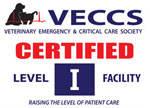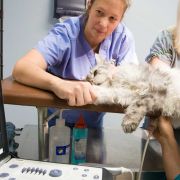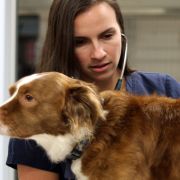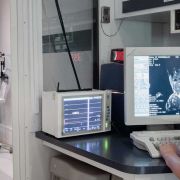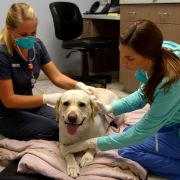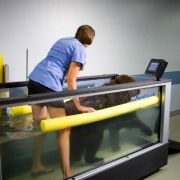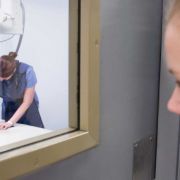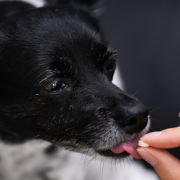Date:
A pet’s cancer diagnosis can be devastating, but it may not mean a shortened lifespan. Recent advances in veterinary oncology have made many treatment options available that can put a pet’s cancer into remission, or, in some cases, even provide a cure. “Cancer” encompasses a wide variety of different tumors—some that require just surgery to eliminate, and some that require further investigation. It’s important to know the type of cancer, the stage of cancer, and the grade of cancer, because many types of cancer are very treatable, and the word “cancer” should not automatically imply a death sentence for your pet.
If your family veterinarian has diagnosed cancer in your beloved pet, Charleston Veterinary Referral Center’s (CVRC) Oncology Department can evaluate her and offer treatment options to prolong her life and improve the quality of it.
What to Do if You Think Your Pet May Have Cancer
According to the American Veterinary Medical Association, 25% of all dogs and 50% of dogs over age 10 will develop cancer. Although there is less information about cancer in cats, our feline friends also commonly develop cancer. Any body system can develop cancer, and clinical signs vary according to the organs affected, but can include:
- A lump of mass anywhere on your pet's body
- Difficulty eating, or a decreased appetite
- Weight loss
- Persistent vomiting or diarrhea
- Difficulty breathing
- Blood from the nose or mouth
- Abdominal swelling
- A wound that will not heal
- Limping or lameness
If your pet shows any of these signs, or is not acting herself, see your family veterinarian immediately. Other diseases can cause the same clinical signs, but reaching a diagnosis as quickly as possible is important, as cancer will not resolve on its own and early detection is critical for successful treatment.
After Your Pet’s Cancer Diagnosis
CVRC’s oncology department is dedicated to treating cancer in pets, and includes several board-certified veterinary oncologists who have extensive training and expertise. If your family veterinarian suspects your pet has cancer, or has diagnosed cancer, the next step is to schedule a consultation with our oncology department. During the appointment, a veterinary oncologist will discuss the various treatment options available, and will establish a treatment plan specific for your pet’s type of cancer and body system involvement. Common cancer treatments include:
- Surgery to remove cancerous tissue
- Chemotherapy, which is the administration of medication that acts directly on cancer cells to prevent them from maturing or reproducing
- Electrochemotherapy, which is the delivery of electric pulses to cancer cells after injecting chemotherapy medication to allow better drug penetration into the cancer cells
- Radiation therapy, which is applied directly to cancerous tissue to kill cancer cells
Treatment methods are often combined to help ensure successful treatment for your pet. For example, a pet’s cancerous tumor may be surgically removed, and chemotherapy medications and radiation may also be used to kill cancer cells that have spread beyond the mass.
Chemotherapy Use for Pet Cancer Treatment
Chemotherapy, which involves the administration of a variety of medications that affect cancer cells, is the most common form of cancer treatment, and is included in most treatment protocols. Some chemotherapy medications come in tablet form that can be given at home, but many must be given by injection during a veterinary appointment.
During a typical chemotherapy appointment, a full exam, including lab work, is performed before medication administration to ensure your pet is healthy enough to receive treatment. Some medications take only minutes to administer, but others may require slow administration through an intravenous catheter over a longer time period to minimize side effects. Most chemotherapy appointments take 30 to 60 minutes. The number of treatments prescribed will depend on the type of cancer, its severity, and your pet’s treatment response.
Chemotherapy Side Effects
The goal of chemotherapy is to not only prolong your pet’s life, but also to maintain good quality of life. Pet chemotherapy differs from human chemotherapy in that veterinary professionals believe the treatment should never be worse than the cancer itself. Chemotherapy medications are administered to pets in lower doses that do not cause the severe side effects that we are familiar with in human patients, such as hair loss and illness.
The most common side effects that pets experience are decreased appetite and mild nausea, which can often be controlled by medication. Some chemotherapy medications cause bone marrow suppression, which decreases blood cell production. Blood tests are performed before chemotherapy treatments to ensure the pet’s blood cell population is sufficient to maintain good health.

Pet Chemotherapy Treatment Outcome
Once diagnostic tests confirm your pet's cancer type, our oncology team will let you know the expected treatment outcome. Some cancers can be cured, and some can be kept in remission for long periods of time, while others may not respond to chemotherapy at all. While we can predict the expected outcome based on other pets' treatment response, each pet is an individual. Regardless of the treatment outcome, our goal is to help your pet have the best quality of life during and after treatment. If you have questions about pet cancer, or if you would like to schedule an appointment with our oncology department, contact our Oncology Coordinator at 843.614.8387.



